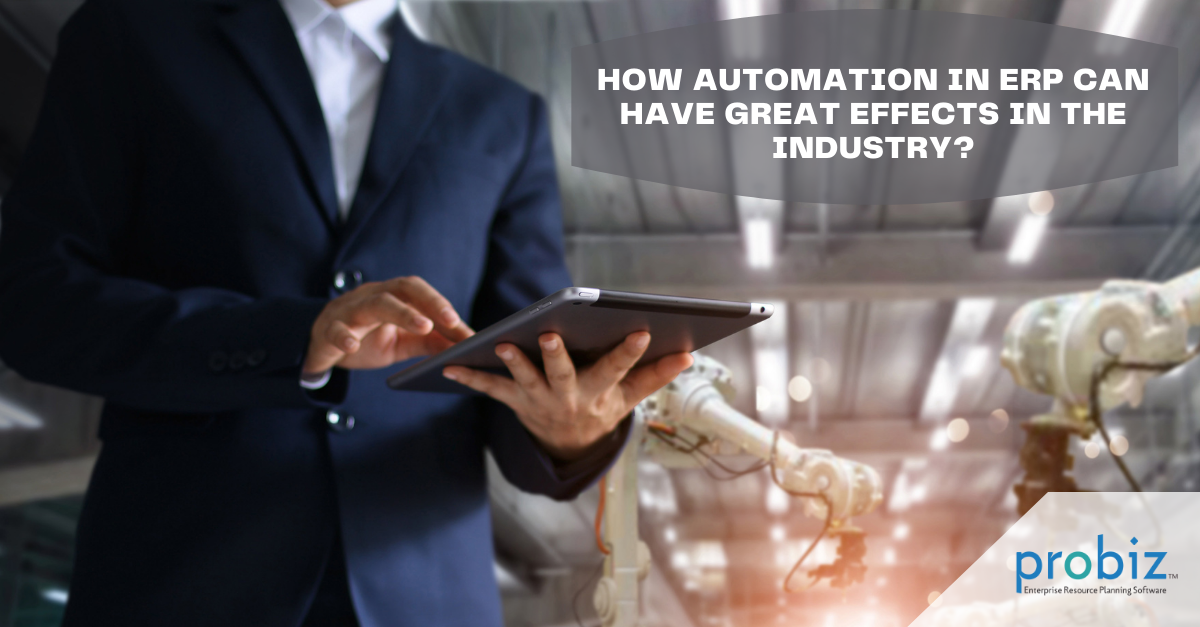A company may employ the most sophisticated software in the world, but unless the information is managed timely, precisely, and completely, the system serves little purpose.
– Wayne L Stayle.
Here, ERP comes into the picture.
ERP software connects people, processes, and resources inside an organization using sound data practices. It integrates business processes, connects disparate databases, and manages commercial functions under the hood. Thereby ERP modules interconnect different departments such as manufacturing, purchasing, planning, accounting, and HR and enable seamless communication with real-time information exchange.
Automation in ERP is taking business performance to the next level with human intervention elimination. Two types of automation are coupled with ERP- automating traditional processes and emerging technologies implementation into ERP.
Here are the benefits that automation in traditional processes brings to businesses worldwide.
- Boost productivity
The manual data handling is inefficient and involves errors too. Plus, the discontinuity and unintended records duplication waste a lot of time for the employees. With ERP automation, the business processes and data stored in silos are connected and stored centrally, which results in processes and workflow automation. The saved time, zero errors and no duplication, and hyper-connectivity help employees to invest time in productive works, which, in turn, fuels up business growth.
- Higher accuracy
Traditionally, resource planning is a mundane task but must be done precisely. However, there exists little room for errors that make things worse. The double-checking eats up double-time as well. That’s where automation through ERP software helps in diminishing the errors caused by manual methods. The up-to-date and accurate data makes the processes faster.
- Going green
The piles of files on the desk and shelves are wreak havoc. It limits the employees to work while they are in the office. The ERP automation makes the processes go paperless and help in reducing the carbon footprint. The departments like- finance, accounting, HR, and billing primarily benefit from this ERP automation due to a lot of paper usage. The companies have started taking the digital initiative to create a less bad impact on the environment.
- Save huge bucks
The companies working in the traditional style invests heavily in staff recruitment that works for data entries and documents management due to errors. On the other hand, automation in ERP replaces the conventional processes with digital, which means no need to employ personnel for data entry, data checking, and data management. Besides, the investment in ERP software pays off in dividends through paperless options and error-free data management. It saves enormous time and thus, save productive hours.
- Generate reports in real-time
No one likes to search a document stacked in of the hundreds of drawers. It involves a lot of hassle, especially when you need the document right away to approve the invoice. The ERP automation improves the visibility into the database and provides access to the data beforehand. The organized business processes facilitate instant access to data that helps in generating reports in real-time. It ensures quality reports generation.
Take a look at the benefits that emerging technologies incorporation in ERP brings to the table.
- Advanced processes integration
The incorporation of AI technology in ERP facilitates routine processes automation and integration of transactions between different departments. The tight integration is improving workflows and enabling increased automation.
- Improving employee’s performance
AI-enabled ERP shifts the employees from repetitive tasks to handling creative charges leveraging AI’s analytical power. It helps employees to upskill them and enhance their abilities within the organization. The engaged employee makes a valuable contribution in helping the company to achieve business goals.
- Instill forecasting capability
With advanced algorithms, AI can predict and execute transactions by analyzing the information stored and exchanged in ERP software. In the inventory, if anything is consumed beyond what has expected during resource planning, then the concerned personnel is informed of materials or resources required. Later, the orders are placed to the supplier as well.
- Uplift security level
The AI-enabled voice interactions are a part of ERP applied to different modules to perform various functions. In addition to hands-free operation and improved task efficiency, it helps in user authentication and action authorization which boosts system security.
- Redefining the maintenance space
With the reduced cost of sensors and increased availability of internet connection, the Internet of Things technology is implemented in ERP software. The intelligent sensors immediately detect and inform the variation in equipment performance to the manufacturers, which results in proactive maintenance, increased uptime, and improved equipment life. Also, it benefits the customers with a diminished equipment failure rate because of the earlier detection of the issue and reduced operating expenses. IoT works excellent at the designing and production stage in a manufacturing plant.
Conclusion
Has the broad spectrum of benefits of automation in ERP tempted you? You certainly want to roll over the changes across the board. Hold on! It won’t happen overnight. Yes, but the migration to cloud-based ERP will help you incorporate the changes in the least time. However, you need to move ahead with strategic planning that involves data migration, training the staff, and pretty more.
Is it still perplexed with a couple of things? Need some assistance? Feel free to connect with our business consultants that will surely help you in everything.

